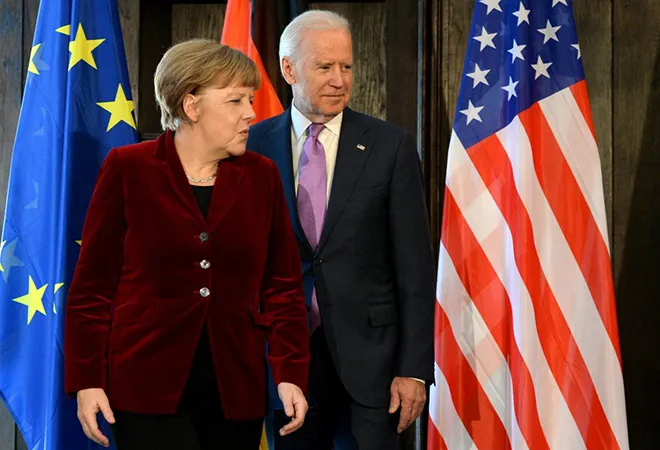
As American industrial titan Henry Ford put it: “The only real mistake is the one from which we learn nothing.” Right off the bat, we are about to find out if the incoming administration of President Joe Biden is fixed in its wrongheaded Wilsonian ways, or is truly capable of learning that the world has radically and genuinely changed.
For gone are the days that the Biden team yearns for, either the tight bipolarity of the Cold War (when both the US and the USSR truly called the shots, generally imposing their will on their allies) or the unipolar American moment, when following the collapse of the Soviet Union, the US briefly found itself the only superpower on the planet. Now, instead, our new age is one characterised by loose bipolarity, with the US and China as the two undisputed superpowers, but with great powers India, Japan, the Anglosphere countries, the EU, and Russia just beneath—all fully capable of crafting their own independent foreign policy course.
But even here the US has an advantage, as the basic strategic choice for India, Japan, the EU, and the Anglosphere is between neutralism and a US tilt, while the basic choice for Russia is between an alliance with China or neutralism. This gives the US an unthought-of gigantic advantage, but only if it acknowledges the relative freedom of the great powers to decide their course for themselves. The Americans need to woo them into their camp, and to accept that prospective allies—for specific reasons of their own—may eschew alliance with America, and instead hew to a neutralist course.
This new geostrategic reality is about to collide fully with the Biden team’s sunny, EU-first view, itself a remnant of the long-past Cold War. For the basic realist truth is that the EU, due to German mercantilism and French Gaullism, is firmly drifting into the neutralist camp.
The new geostrategic reality is about to collide fully with the Biden team’s sunny, EU-first view, itself a remnant of the long-past Cold War. For the basic realist truth is that the EU, due to German mercantilism and French Gaullism, is firmly drifting into the neutralist camp.
A thought experiment makes this clear in policy terms. Imagine what Biden’s first phone conversation with Chancellor Angela Merkel, the most powerful single EU decision-maker, will sound like. “Angela, it’s a pleasure to work with you and your government, as we share a fundamental commitment to the same norms, values and interests. And now that Trump is out of the way, please do spend more money on your defense (Berlin spent a paltry 1.3 percent of GDP in 2019), let’s champion Navalny and human rights in Russia by you curtailing the almost-built Nord Stream 2 pipeline, please have the EU take care of its Balkan and North African backyard while we focus on China, remove Huawei from your telecoms systems, and pivot with us to jointly take on Beijing itself.” Mrs Merkel will then look embarrassedly at her shoes and do nothing. Then, and only then, will the Biden White House realise the practical extent of their problem with the EU. Just recently, with rather unseemly haste, the EU went ahead (over the objections of the Biden team) and
signed an investment agreement with China, just as the new White House was castigating Beijing for its egregious human rights violations against the Uighurs in Xinjiang province, and as the Chinese air force
brazenly violated Taiwan’s air space.
The comments of the new German CDU leader, Armin Laschet (firmly in the Russophile wing of the party), have not helped either. Laschet said Germany’s attitudes towards Beijing might be different if it did not have a car industry (fully one in every two Volkswagons is sold in China). It is clear that German mercantilism is leading the EU to accommodate both Beijing and Moscow, rather than viewing them primarily as geostrategic rivals.
The key strategic question will soon be a very different one than the Europe-first Wilsonian Biden team had counted on. Given the EU’s increasing neutralism in the brewing Sino-American Cold War, who then can the US count on as allies? The good news for the White House is that there is a different approach readily to hand which answers this vital question perfectly. America’s natural allies in the new era are an alliance of great powers Japan and India, coupled with the Anglosphere (Australia, New Zealand, Canada, and the UK).
The key strategic question will soon be a very different one than the Europe-first Wilsonian Biden team had counted on. Given the EU’s increasing neutralism in the brewing Sino-American Cold War, who then can the US count on as allies? The good news for the White House is that there is a different approach readily to hand which answers this vital question perfectly
All of these countries see Chinese expansionism in Asia as the primary threat to the global order. All have decided to limit Huawei’s involvement in their telecoms systems (unlike the EU). All already work together through a series of interlocking groupings, be it the
Quadrilateral Initiative (India, Japan, the US, and Australia) through the CPTPP trading initiative, or through the
Five Eyes intelligence-gathering consortium (US, UK, Canada, Australia, New Zealand). This informal, but vital, great power grouping is the obvious, organic, already-existing, alternative to begging the Europeans to do things they simply will not, based on their very different understanding of the new era.
I am cheered by the old Washington adage that “Americans talk like hippies, but act like gangsters.” Simply put, after naively and wrongheadedly looking at the world through rose-coloured glasses, the US usually comes to its senses, intellectually adjusts, and acts based on its own concrete interests.
And all those interests point to this new Asia-first, great power alliance.
The views expressed above belong to the author(s). ORF research and analyses now available on Telegram! Click here to access our curated content — blogs, longforms and interviews.



 As American industrial titan Henry Ford put it: “The only real mistake is the one from which we learn nothing.” Right off the bat, we are about to find out if the incoming administration of President Joe Biden is fixed in its wrongheaded Wilsonian ways, or is truly capable of learning that the world has radically and genuinely changed.
For gone are the days that the Biden team yearns for, either the tight bipolarity of the Cold War (when both the US and the USSR truly called the shots, generally imposing their will on their allies) or the unipolar American moment, when following the collapse of the Soviet Union, the US briefly found itself the only superpower on the planet. Now, instead, our new age is one characterised by loose bipolarity, with the US and China as the two undisputed superpowers, but with great powers India, Japan, the Anglosphere countries, the EU, and Russia just beneath—all fully capable of crafting their own independent foreign policy course.
But even here the US has an advantage, as the basic strategic choice for India, Japan, the EU, and the Anglosphere is between neutralism and a US tilt, while the basic choice for Russia is between an alliance with China or neutralism. This gives the US an unthought-of gigantic advantage, but only if it acknowledges the relative freedom of the great powers to decide their course for themselves. The Americans need to woo them into their camp, and to accept that prospective allies—for specific reasons of their own—may eschew alliance with America, and instead hew to a neutralist course.
This new geostrategic reality is about to collide fully with the Biden team’s sunny, EU-first view, itself a remnant of the long-past Cold War. For the basic realist truth is that the EU, due to German mercantilism and French Gaullism, is firmly drifting into the neutralist camp.
As American industrial titan Henry Ford put it: “The only real mistake is the one from which we learn nothing.” Right off the bat, we are about to find out if the incoming administration of President Joe Biden is fixed in its wrongheaded Wilsonian ways, or is truly capable of learning that the world has radically and genuinely changed.
For gone are the days that the Biden team yearns for, either the tight bipolarity of the Cold War (when both the US and the USSR truly called the shots, generally imposing their will on their allies) or the unipolar American moment, when following the collapse of the Soviet Union, the US briefly found itself the only superpower on the planet. Now, instead, our new age is one characterised by loose bipolarity, with the US and China as the two undisputed superpowers, but with great powers India, Japan, the Anglosphere countries, the EU, and Russia just beneath—all fully capable of crafting their own independent foreign policy course.
But even here the US has an advantage, as the basic strategic choice for India, Japan, the EU, and the Anglosphere is between neutralism and a US tilt, while the basic choice for Russia is between an alliance with China or neutralism. This gives the US an unthought-of gigantic advantage, but only if it acknowledges the relative freedom of the great powers to decide their course for themselves. The Americans need to woo them into their camp, and to accept that prospective allies—for specific reasons of their own—may eschew alliance with America, and instead hew to a neutralist course.
This new geostrategic reality is about to collide fully with the Biden team’s sunny, EU-first view, itself a remnant of the long-past Cold War. For the basic realist truth is that the EU, due to German mercantilism and French Gaullism, is firmly drifting into the neutralist camp.
 PREV
PREV


